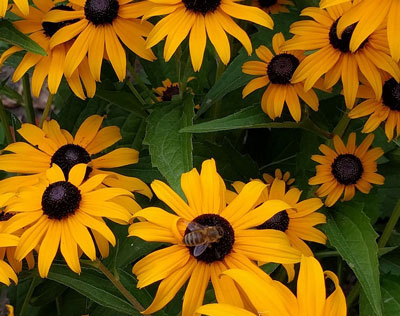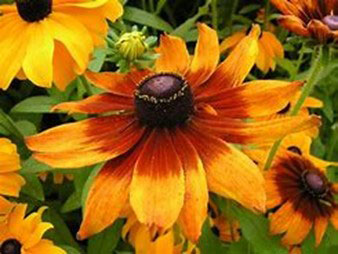Arkansas Garden Blog
Contact
Randy Forst
Extension Educator - Consumer Horticulture
Phone: (501) 671-2245
Email: rforst@uada.edu
University of Arkansas System
Division of Agriculture
Cooperative Extension Service
2301 S. University Ave.
Little Rock, AR 72204
September Plant Pick: Black-Eyed Susans
by Randy Forst
 Black-Eyed Susan (Rudbeckia species)
Black-Eyed Susan (Rudbeckia species)
This is a tough, reliable perennial that holds up to the Arkansas heat and keeps on flowering!
Planted in mass they can be a showstopper!
They are members of the Asteraceae family and are native to both damp woodlands and dry prairies in North America. Most are considered perennial; however, there are some annual species, such as R. hirta.
Species commonly available are R. hirta, R. fulgida, R. grandiflora, and R. triloba. Do not worry about the annual varieties, they will re-seed!
 Rudbeckia species have an average growth rate and prefer full sun (greater than 6 hours of
direct sunlight) but will tolerate partial shade. Rudbeckia prefers evenly moist,
well-drained soils, but they are drought and heat-tolerant once established. They
can also grow well in many types of soils.
Rudbeckia species have an average growth rate and prefer full sun (greater than 6 hours of
direct sunlight) but will tolerate partial shade. Rudbeckia prefers evenly moist,
well-drained soils, but they are drought and heat-tolerant once established. They
can also grow well in many types of soils.
What are the advantages of planting black-eyed Susans?
Rudbeckia’s upright growth and coarse texture make it ideal for mass plantings in naturalized areas. The pollinators love the showy flowers and if blooms are left to seed, it is a great food source for birds.
Another advantage of having this plant in your garden is the attraction of beneficial insects. These beneficial insects love to feed on thrips, aphids, and whiteflies.
Rudbeckia are usually not plagued by disease problems. If disease does occur, it is caused by excessive moisture on the leaves. We know that this can happen by unusually frequent rainfall or overhead irrigation.
If you have a sunny spot in your garden and want a perennial that is dependable and will pack a punch, try Rudbeckia. You are going to love it!
Related Links